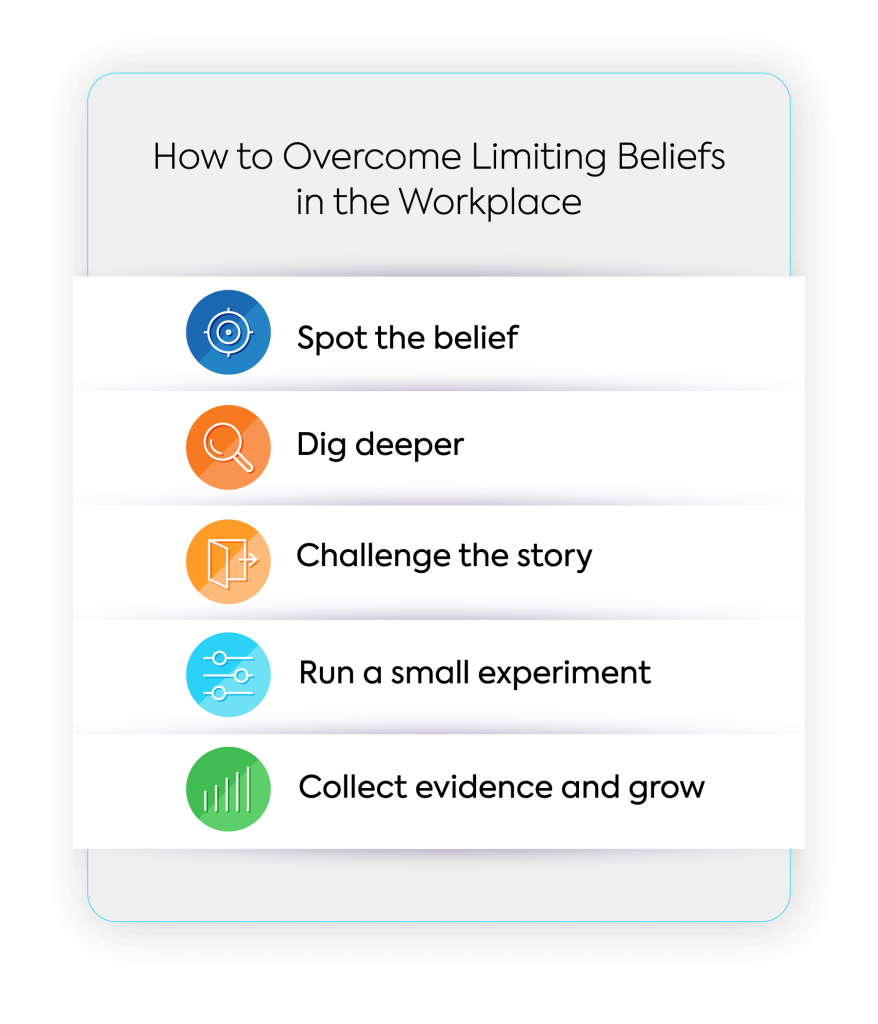Have you ever thought, “I’m not ready for that promotion” or “I’ll never really master public speaking”?
Such negative thoughts are common and often labeled as limiting beliefs.
Sometimes, people believe things about themselves that aren’t true. These thoughts can hide in their minds. They don’t even know they’re there. But the thoughts can still stop them from doing well at work. This can happen even if the person is very good at their job.
Imagine a really good chef. They can cook very well, but they believe they can’t be the boss in the kitchen. They think they weren’t born to be a leader. Because of this, they don’t try to become the head chef.
The effect is a direct cap on their potential, which affects both the company and overall employee well-being.
The guide shares helpful tips, shows how to spot these common beliefs in your team, and gives easy ways to help people change these thoughts. This helps support their personal growth and happiness as well as their professional development.
What are self-limiting beliefs?

Self-limiting beliefs are thoughts we tell ourselves. These thoughts say what we can or can’t do. They are ideas we believe about ourselves and the world.
These beliefs are not facts. They are strong thoughts we believe. We often don’t know where they come from, and can start from things that happened before. They can come from what others say or what we see in the world around us.
Some people have strong emotional intelligence, which enables them to sidestep a lot of these beliefs, but some get completely consumed by them.
These beliefs are like invisible fences. They guide what we do and stop us from trying new things. We don’t always notice them. For example, a great sous-chef might think, ‘I’m good at making new dishes. But I’m not good with budgeting or leading people. So I can’t be a head chef.’
While this conviction might feel very real to the individual, it’s a belief, not a fixed trait.
Because of that belief, the chef might not try for a bigger job. They miss a chance to grow as a leader or use their cooking skills more.
How limiting beliefs impact success in the workplace
Self-limiting beliefs act as powerful, unseen brakes on success.
When these beliefs get stronger, people start saying no to big chances. They might not try for a promotion. They might skip leading an exciting project; they stop themselves without even knowing it.
The person may feel they’re simply not ‘cut out for it,’ regardless of their actual capabilities. People might make big job choices for the wrong reason. They feel like they’re not good enough and don’t believe in themselves. So they choose based on fear, not confidence.
Our talented chef might think, ‘I’m good at cooking, but not at leading or handling money.’ Because of this thought, they may miss chances to grow. They might not take charge of inventory or share a big idea for a new restaurant. They hold back instead of stepping up.
Therefore, their chances of getting executive roles are lower, not because they lack enough cooking skills, but because they lack the necessary managerial skills.
When people avoid trying new things, they stay in their comfort zone, ultimately limiting their growth. Carol Dweck, a mindset expert, says some people think their skills can’t change. They feel they must keep proving they’re good instead of learning new things.
4 limiting beliefs examples we often face
Self-limiting beliefs subtly yet persistently shape our professional lives. Often appearing as reasonable thoughts, they can be tricky to spot. Understanding common patterns helps in recognizing them within ourselves and our teams.
Let’s walk through the four most common examples, as seen through our chef.
The “Not Truly Good Enough” belief
Linked to impostor syndrome, whispers that achievements are luck, not skill, instill fear of exposure. Our chef, who was praised for a new menu, might think, “A fluke—great ingredients. Can’t replicate it. They’ll see I’m not that innovative.” This doubt leads to downplaying success and avoiding high-stakes projects.
The “I Lack the Essential Qualities” belief
Reflects a fixed mindset. It’s the conviction that vital skills are unchangeable, and one lacks what’s needed for certain roles. Faced with an important GM training opportunity requiring financial acumen, our chef muses, “I’m a cook, not a numbers person. You either have that business sense, or you don’t.” Consequently, they might avoid programs vital to broader leadership.
The “It’s Too Risky, I’ll Fail” belief
This one is rooted in fear of failure. Apprehension about unbearable consequences can paralyze initiative. When urged to design an experimental menu, our chef thinks, “If it flops, my reputation suffers. It’s safer to be traditional.” This results in conservative choices, stifling creative growth.
The “Success Isn’t for Someone Like Me” belief
It stems from unworthiness or self-limitations—a feeling that big achievements are for others. Observing peers from elite schools in top roles, our chef from a local program reflects, “Those roles go to chefs with pedigree. There’s a ceiling for my background.” Such beliefs can lower career aspirations.
What causes us to have self-limiting beliefs?
Self-limiting beliefs rarely appear overnight.
They’re often carefully yet unconsciously constructed from life’s countless experiences, such as past setbacks, a single pointed criticism, or observing the self-limiting patterns of influential figures.
For instance, our chef might trace a reluctance to experiment with bold flavors back to an overly harsh critique of an early culinary creation.
Learned responses also play a big role—if people around us avoid risk, we might do the same.
Even well-meant feedback, if misinterpreted through a lens of self-criticism, can solidify a belief that we are not skilled enough.
Societal narratives about talent and success add another layer, subtly shaping who we believe we can become.
These threads then weave together, forming ingrained mental maps that define our comfort zones until consciously re-examined.
How to prevent self-limiting beliefs in a workplace culture
To stop self-limiting beliefs, we need to build a workplace where people believe they can grow.
It starts with a growth mindset. That means seeing hard things as chances to learn. It means trying matters more than being perfect.
For example, imagine if the chef’s kitchen said, “Trying new dishes is fun and brave!” instead of “You must get it right.” This would help people feel safe to try without fear.
Leaders also help by making the team feel safe. People should feel comfortable sharing ideas, asking questions, or trying new things—even if they don’t immediately succeed.
It also helps to have training, helpful feedback, and mentors. Hearing real stories of others who grew over time can give hope.
Lastly, a special self-limiting belief course can help a lot. These courses are online, and people can do them in the form of self-directed learning. They help break those old, unhelpful thoughts that stop people from growing.
How to overcome limiting beliefs in the workplace

The internal narratives that limit our potential can feel like unshakeable truths. Yet, with deliberate effort and the right approach, these ingrained beliefs can be reshaped, opening doors to new levels of achievement and contribution in the workplace.
Spot the belief
First, it is necessary to unearth the belief and truly understand its foundations. Go deeper than just naming it.
Dig deeper
Ask searching questions like:
- When did you first start believing this?
- What specific experiences seem to “prove” it true?
- Importantly, what has upholding this belief cost you in terms of opportunities or personal growth?
Our chef, for example, might identify the belief, “I’m not effective in high-pressure leadership roles.”
Challenge the story
Then, by exploring your roots, they might recall a single overwhelming service early in their career. Acknowledging the opportunities missed by avoiding such roles clarifies the true impact of the belief.
Run a small experiment
With this understanding, the next step is to consciously design a new, empowering narrative and then actively live your way into it through small, deliberate actions—almost like conducting personal experiments.
This could mean crafting our chef’s counter-belief: “I am building my capacity to lead effectively under pressure by focusing on clear communication and team delegation.”
Their first test might be leading the planning for just one part of a big catering event. They’d focus on delegating tasks carefully and letting the team update them daily.
Collect evidence and grow
No matter how small, each successful experiment builds compelling new evidence, gradually dismantling the old limiting structure and creating lasting change.
Start building a continuous growth mindset
Finding and changing limiting beliefs is not a final destination but a constant practice of self-awareness and intentional growth.
Fostering environments where this practice is encouraged is a very important part of training for learning and development professionals, HR managers, and business owners. It is about creating spaces where people, like our chef striving for new heights, feel empowered to challenge their own perceived boundaries.
As Adam Grant wisely puts it, “a hallmark of an open mind is not letting your ideas become your identity. It’s being willing to rethink your assumptions.”
Embracing this spirit of rethinking lets both people and organizations truly reap the benefits of employee training.
This helps them be resilient, creative, and ultimately, a more dynamic and capable workforce.
The path forward is one of continuous learning and courageous evolution.




4 Comments
qwjm86
vx0vwl
wq69uj
feu5j2